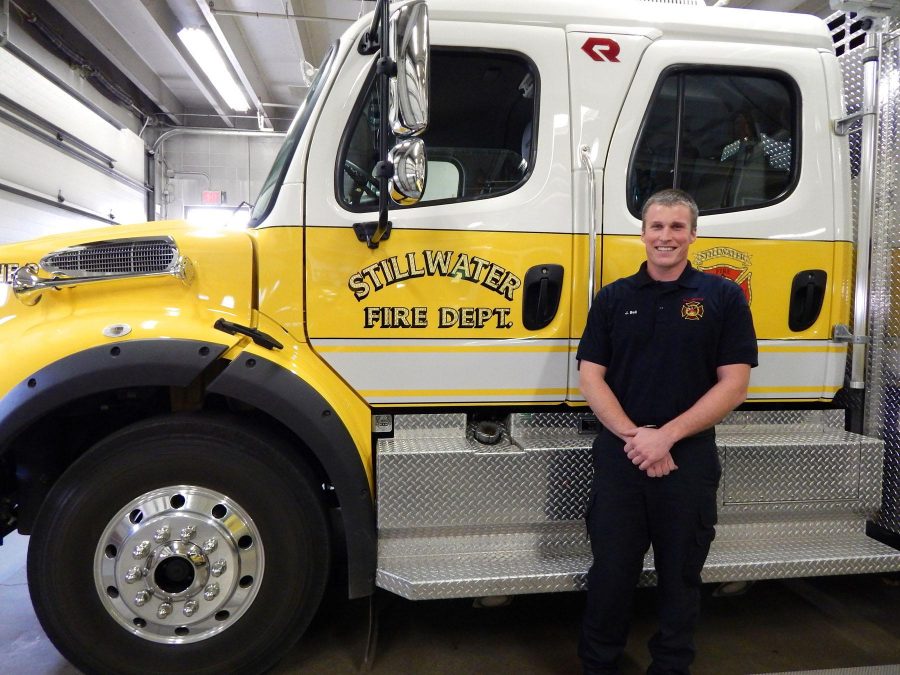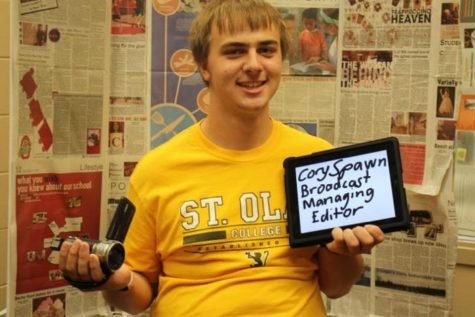Peterson saves lives around the clock
Through his experience as a full-time firefighter in St Paul, Guy Peterson has learned the importance of teamwork and diversity. “People are thankful that we are there and are grateful that we are there unlike some law enforcement jobs where it is not always a good thing to see them,” said Peterson.
December 10, 2013
Many kids dream of being firefighters when they are in preschool or kindergarten. Few actually do go on to become one. The job is very important and people like retired firefighter Guy Peterson are very well respected heroes in the community. Peterson worked for the St. Paul Fire Department.
In order to become a fireman, people go through training in not only fighting fires, but also for first aid and rescue. Once they finish their training, they can be a part of a fire department. There are two types of fire departments, the full time and volunteer. Most in the Stillwater area are volunteer, but larger cities have full time fire departments.
“I went to college and took tests, not really knowing what I wanted to do. One day the two people I lived with, went to get applications from the fire department. They never took the test, so I took one of their applications and took the test and 18 months later, the card came,” explained Peterson.
As a fireman, he has seen many life or death situations and has saved many people.
“I had to pull the father of one of my fellow firefighters out of a burning building. That was kind of special and memorable,” said Peterson.
Firemen do more than spray water on fires. They have to clean and maintain the equipment and do other calls such as medical calls.
“A typical day was go to work, check your equipment and then do housekeeping you know, like clean and tidy up around the station. Then there was training, either in the morning or afternoon, but that could be interrupted. We didn’t really sleep at night. Our night was midnight to 6,” explained Peterson. “On the days that we had off, some people would work in their other jobs in construction or landscaping.”
Some jobs are all work and no play but this job is not like that. When there is no other work to do, firemen have time to do other things.
“I lived at the station with the other firefighters. You had to learn to cook. it never had to be elaborate or anything, it just had to be food. In my off time, I started to build fishing rods and now, even though I don’t like to call it this, I am a professional fisherman,” said Peterson.
Over the years, many things have changed in the career of fighting fires in both the job itself and in becoming a fireman.
“The biggest change to the job was diversity. It brought women to the job. Of course technical changes came as technology improved. Life in the station changed as well because of women being allowed to become firefighters and also because we were at work 24 hours a day,” explained Peterson.
Even though many firemen live at the fire station, they are never alone. The other firefighters become their second family.
“Bonding is over the top,” said Peterson. “Friends and family become involved in the job.”
Getting started in the job is not too hard and it teaches and exercises many life skills in the potentially life or death scenarios that firefighters see.
“Back when I started you only had to be a high school graduate, and I think that is still true today. You do have to be EMT certified before you start, but back when I started, you became a firefighter and were certified after joining the department. It is a very gratifying experience that teaches a lot of teamwork and makes you become involved,” Peterson explained.
The job can be very exhausting and intensive or can be very slow depending on the day. Many calls were very small for the St. Paul Fire Department. Response time was only 3 minutes, so fires didn’t have time to spread. Out near Stillwater, response time is about 9 minutes.
“A small kitchen fire would not have time to spread through the house with short responses causing all of our fires to be very small. Commercial fires were the busy ones because buildings were much bigger,” he said.
Firefighters have a very important job in the world, not just because they stop fires, but because they save lives.
“People are thankful that we are there and are grateful that we are there unlike some law enforcement jobs where it is not always a good thing to see them,” said Peterson. “Looking back on this is like a book that I read, but it’s not like I want to go back to work again,” he added.









Ryan Burger • Jan 13, 2014 at 1:59 am
It was very interesting to read what their lives are like. One understands that they save many lives, but what they have to do isn’t very common to know. Great research and quotes!
Cole Funck • Jan 9, 2014 at 7:39 pm
This is a great look into the life of a volunteer fireman. It’s a nice mix of both saving people as well as the more mundane part of the job. All together a well written and we’ll put together article.
Madeline Ek • Jan 1, 2014 at 5:54 pm
I really like the quotes in your article! They are full of information and give me a better understanding about what a fire fighter really does. The nut graph was also full of good information. The only thing you could improve on is making better transitions between topics, I got a little confused at times.
Megan • Dec 26, 2013 at 9:11 pm
This article caught my eye because of the heading. ” saving lives around the clock”. One quote that is kinda scary is when he is talking about the responding time is 3 minutes in St. Paul and here in stillwater it is about 9. Knowing how fast fires spread, it makes me think how fast things do burn down.